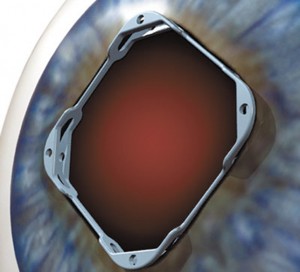By David A. Goldman MD –
 While the overwhelming majority of patients do incredibly well with cataract surgery, there will always be a small subset that has an unfortunate outcome. Complications can occur with the best or worst surgeons and can range from easily correctable errors to complete loss of vision. Fortunately, the risk for permanent loss of vision is low; recent studies suggest a rate of 1:3,000 for blinding infections after cataract surgery. Other problems can occur either during surgery or long after surgery, and many times patients will have predisposing risk factors.
While the overwhelming majority of patients do incredibly well with cataract surgery, there will always be a small subset that has an unfortunate outcome. Complications can occur with the best or worst surgeons and can range from easily correctable errors to complete loss of vision. Fortunately, the risk for permanent loss of vision is low; recent studies suggest a rate of 1:3,000 for blinding infections after cataract surgery. Other problems can occur either during surgery or long after surgery, and many times patients will have predisposing risk factors.
One example is called floppy iris syndrome. While patients who are diabetics may have poorly dilating pupils, patients on medications such as Flomax typically have well dilated surgery before beginning surgery. When pupils are large, accessing the cataract is very simple. The smaller the pupil is, the more challenging the surgery can be. Diabetic patients are usually recognized at the onset as having smaller dilating pupils and are treated appropriately. Flomax-users, however, can be challenging because their pupils will suddenly constrict during surgery and catch the surgeon by surprise. Telling your cataract surgeon that you are taking a medication such as Flomax is very helpful, and fortunately now there are several treatments to minimize the floppiness of the iris, but nevertheless there can still be complications. One possibility is called iridectomy – this is when the iris, typically in a floppy state, will get pulled into the vacuum responsible for removing the cataract. This can leave the iris with a small hole that may cause inadvertent light to enter the eye. Typical complaints include glare and haloes. If the iridectomy is significant, a pupilloplasty (surgical closure of the hole with sutures) may be indicated.
Other problems include lens decentration. In some cases, the support system within the eye that normally supports the lens becomes damaged. In those cases, the lens may not be well centered and may require to be exchanged or repositioned. Many patients have a condition called pseudoexfoliation syndrome. One of the unfortunate effects of this condition is that the support structure holding the lens is inherently weak. In some cases, nearly tapping on the cataract at the beginning of the surgery will cause the entire lens to fall back on the retina. Fortunately this too can be well managed with the assistance of a retinal surgeon. In most cases, however, surgery in these patients goes very well. Because it is a progressive condition, many of these patients will develop lens decentration decades later. These cases can be more challenging as the patients are much older and the lens can have significant scar tissue around it. In most cases, however, the lens complex can be recentered with sutures with a minimally invasive technique.
The most common complication occurring following uncomplicated cataract surgery is called cystoid macular edema (CME). Much like a bump on the arm may cause a bruise and swelling, cataract surgery may cause swelling in the back of the eye. Typically this occurs between 4-8 weeks after cataract surgery, and presents as a slow progressive blurring of the vision. In most cases this resolves with prescription eye drops, but some resistant cases of swelling may require more invasive techniques.
It is important that whether you are having a problem with your vision after cataract surgery days later, or years later, that you speak with your ophthalmologist. Communication is the most important part of a successful doctor-patient relationship. If you feel that your physician is not listening to you, or simply desire a second opinion, you should seek consultation with another MD. This is rarely upsetting to the primary ophthalmologist, and in most cases helps alleviate any patient anxiety at which point most patients return to their original provider.
561-630-7120
www.goldmaneye.com
Check Also
WHY DO I FEEL SO TIRED ALL OF THE TIME, AND NOTHING WAKES ME UP?
By Renee Chillcott, LMHC When it comes to a feeling we can’t tolerate and want …
 South Florida Health and Wellness Magazine Health and Wellness Articles
South Florida Health and Wellness Magazine Health and Wellness Articles




